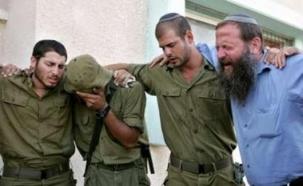
After a long standoff with young settlers in the synagogue of Gush Katif on August 18, Israeli soldiers kissed the ark where the torah is kept.
Elie Wiesel, a professor of humanities at Boston University who was awarded the Nobel Peace Prize in 1986 asks us to imagine:
Let's imagine it, if you will. Let's imagine that, faced with the tears and suffering of the evacuees, the Palestinians had chosen to silence their joy and their pride, rather than to organize military parades with masked fighters, machine guns in hand, shooting in the air as though celebrating a great battlefield victory. Yes, imagine that President Mahmoud Abbas and his colleagues, in advising their followers, extolled moderation, restraint, respect and a little understanding for the Jews who felt themselves struck by an unhappy fate. They would have won general admiration.
I will perhaps be told that when the Palestinians cried at the loss of their homes, few Israelis were moved. That's possible. But how many Israelis rejoiced?
And now, where are we? A lull is imperative. The tears must be allowed to dry and the wounds to heal. Haste, in this delicate moment, is dangerous.

There it is. There it is. Weisel is saying that it is how we emotionally respond to the disengagement that will determine whether it is successful in leading to peace. How did you respond watching the news this week? Do we need a national week of shiva? Ari Shavit:
Gush Katif was a world of its own - a world of work and faith, of patriotic innocence and communal warmth; a world that touches the heart, that was established in the wrong place at the wrong time. Now, as this world is being buried in the sand, Israel must sit shiva for it. For if the entire public does not know how to mourn the death of Gush Katif, its death will poison our lives.
Finally, well done to all the Policeman and Soldiers , particularly IDF Chief of Staff Dan Halutz and Police Commissioner Moshe Karadi, who carried out the disengagement with such restraint and derech eretz.
1 comment:
My responses vasiliated from anger, to restraint, to resignation to the idea of maybe there can be some security for the Jews afterall.
What Weisel, one of my heros says, is so on point. Why rejoice, cheer or act as if there has been a victory in the face of tears and loss for so many? What does this say about the new owners of those homes in Gaza, about Abbas, and the likelihood for peace?
As I have stated on my blog, I do not expect peace. Jew hatred looms large, especially for many Palestinans and Arabs in and surrounding that region. My hope is that there will be security for our people, so that we can protect the Jewish state, and that there be no more bloodshed.
Post a Comment